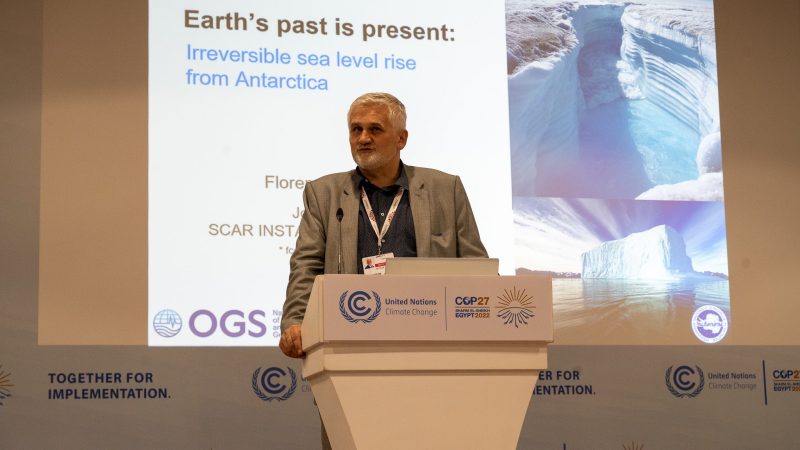Armenia and Bulgaria also wanted to host the 29th United Nations Climate Conference. The two countries ultimately withdrew their candidacy in favor of Baku.
After the United Arab Emirates this year, another country whose economy depends on hydrocarbons is expected to host the UN Climate Conference in 2024. “I am happy to announce that there is a general consensus around the candidacy of Azerbaijan to host the COP29”, welcomed Mukhtar Babayev, the Azerbaijani Minister of Ecology, during a speech at the COP28 in Dubai, Saturday December 9.
“We are very grateful for the support of all countries, especially those in the Eastern European Group and the host, the United Arab Emirates. We are committed to working inclusively and collaboratively with all, so that COP29 is a success,” added Mukhtar Babayev. Comments supported by the Russian climate envoy, Ruslan Edelgeriev: “We welcome the compromise we have reached in the Eastern European group,” he also declared on Saturday.
These announcements, unexpected just a few days ago, seem to mark the end of several months of blockages surrounding the organization of COP29. This must be hosted by an Eastern European state, each COP being organized in a different region of the world from one year to the next. A consensus seemed unrealistic until now, particularly due to the recent armed conflict between Armenia and Azerbaijan, and Russia’s opposition to the candidacies of EU member states.
Tensions linked to Nagorno-Karabakh
As reported by the ClimateChangeNews.com website, Azerbaijan, Armenia and Bulgaria defended their respective candidacies to host the 29th United Nations Climate Conference in June. An agreement was necessary within the group of Eastern European States – which has 23 members – to designate the country hosting the next COP. However, Baku and Yerevan mutually opposed the candidacy of their Caucasian neighbor, in a context of conflict between the two countries, reports Politico.
For several decades, Armenia and Azerbaijan have been at odds over the Nagorno-Karabakh region, inhabited by a predominantly Armenian population. Baku reconquered this region in September following a lightning offensive against Armenian separatists – pushing more than 100,000 residents of the region to flee to Armenia. The territory had already been marked by two wars, one in the early 1990s and the other in the fall of 2020, which left several tens of thousands dead.
Russian veto for an EU country
Faced with the blockage between Armenia and Azerbaijan, Bulgaria’s candidacy presented itself as a possible alternative. Russia, however, opposed any candidacy from an Eastern European state that is a member of the European Union, states Politico.
As early as April, the Russian delegation to the United Nations Framework Convention on Climate Change sent an e-mail to representatives of Eastern European countries, warning them of this opposition. “It is reasonable to believe that EU countries, driven by Brussels policy, do not have the capacity to serve as honest and effective intermediaries in global climate negotiations,” she explained in this message. , consulted by Reuters.
Behind the scenes, the Russians’ argument “is that they are blocked by EU countries on various issues linked to the war in Ukraine”, estimates Julian Popov, Bulgarian Minister of the Environment, speaking to Politico. “They kind of fight back.”
Warming up with Armenia
On Thursday, five days before the end of COP28, a joint declaration from Armenia and Azerbaijan marked a turning point after months of impasse. In this joint statement, the Armenian Prime Minister and the presidential administration of Azerbaijan expressed an “intention to normalize relations” between the two countries, “and to reach a peace treaty on the basis of respect principles of sovereignty and territorial integrity. A surprise announcement welcomed by the international community, after negotiations which have been slipping in recent weeks.
Their declaration also mentioned the thorny question of the organization of COP29. In order to show a “gesture of goodwill”, Armenia assured that it now supported Azerbaijan’s candidacy, “by withdrawing its own candidacy”. The next day, a press release from the Ministry of the Environment announced the withdrawal of the Bulgarian candidacy, “in a spirit of goodwill and in the interest of a successful climate conference organized by the European Group of ‘East”.
The choice of the Azerbaijani candidacy must still be ratified in the coming days at COP28. If confirmed, a new country whose economy depends on fossil fuels will host climate negotiations next year. In Azerbaijan, oil and gas were responsible for 90% of export revenues in 2021, according to the International Energy Agency. These energies also financed around 60% of the government budget.
On ClimateChangeNews.com, analyst Tom Evans, of the global warming think tank E3G, considers this candidacy “unusual and unexpected”. Azerbaijan, a member of an alliance with oil-producing countries, OPEC+, “does not have much experience in climate diplomacy”. It is also considered an authoritarian country, led with an iron fist by Ilham Aliev since 2003.
This article is originally published on francetvinfo.fr









